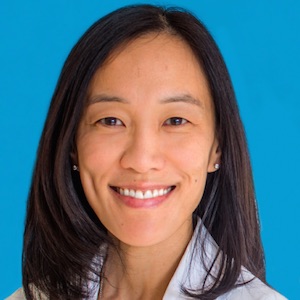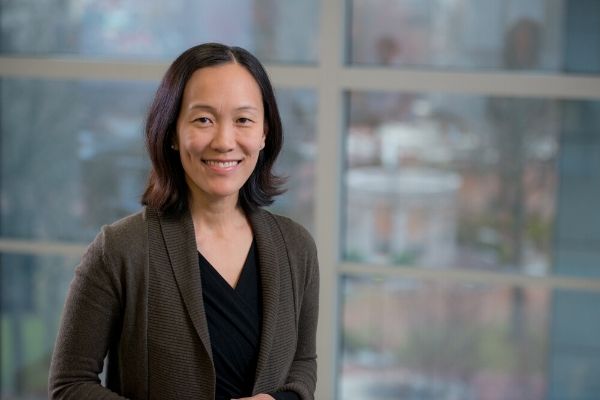Esther Choo, MD, MPH, was honored with the Dr. Wes Curry Emergency Medicine Diversity Leadership Award at Vituity’s 2019 Executive Leadership Diversity Summit.
Dr. Choo is interim executive director and a founding member at TIME’S UP Healthcare, founder at Equity Quotient, and an associate professor of emergency medicine at Oregon Health & Science University. As a champion of gender and racial equality in healthcare, she’s bringing public awareness to discrimination and harassment of healthcare workers.
We recently sat down with Dr. Choo to learn more about her commitment to diversity in healthcare.
How did you become such a passionate advocate for inclusion and equity in medicine?
Esther Choo: Both medical school and residency exposed me to many people who stood up for vulnerable populations and ending health disparities. One example is Gail D’Onofrio [MD, MS], longtime chair of the Department of Emergency Medicine at Yale. She doesn’t mince words when advocating for women. As a student, I was impressed that she could talk about very difficult topics without softening her language or losing her directness. She really drove home to me how all women could and should have voices in healthcare.
Later, as I got involved with advocacy groups like the Academy for Women in Academic Emergency Medicine, I realized that women and minorities face specific challenges in healthcare related to persistent health disparities.
These days, I do a lot of the typical academic things, like researching, pursuing grants, and publishing papers. These things are important in the long term. But it's also important to get involved with education and advocacy so that you can try to effect change sooner and with a broader audience.
You’ve been involved with so many great advocacy initiatives and programs. Which ones, in your experience, had the biggest impact?
Esther Choo: TIME’S UP Healthcare has definitely been on a different level. TIME’S UP is an organization that advocates for safety, dignity, and equity in all workplaces. It does this through awareness and education but also through a legal defense fund, which supports women experiencing harassment and other forms of discrimination. TIME’S UP also has a research and policy arm in Washington, D.C., that looks at legislative changes needed to make all work equitable, dignified, and safe. So it's hitting the problem from many different angles.
It’s hugely ambitious, and the healthcare initiative is just getting started. But I really love the opportunity to connect issues in healthcare to parallel issues in other industries. Because women face the same challenges across career fields, there's tremendous potential for us to do good work together and be part of a broader cultural conversation.
How did you become a founding member of TIME’S UP Healthcare?
Esther Choo: It all started when a friend connected me to the TIME’S UP communications director through Twitter. At the time, TIME’S UP was already working in a number of industries, including entertainment and advertising. A few of us connected to the TIME’S UP leadership and realized that healthcare was a good place to start another TIME’S UP initiative. People say nothing real happens on social media, but it's really been a transforming experience for me!
You’ve really been an amazing voice on Twitter. In your experience, how can people use social media to effect social change?
Esther Choo: First, realize that there's a tremendous opportunity there. There are billions of people on social media, many of whom are looking for good content and strong voices. Over the past six years, I’ve put a lot of time into maintaining a consistent, steady presence and trying to create the kind of content that can stimulate conversations. I'm still learning a lot, but I appreciate the potential.
Not every tweet will change the world. But sometimes you can create enough of a conversation to bring media attention to a topic and take the discourse to a new level and a wider audience.
Have you ever had an experience like that?
Esther Choo: In 2018, a regional AMA journal published an article that defended pay inequity. One of their sources tried to make the case that women physicians deserve less pay because they “don’t work as hard.” I was able to use social media to call attention to this article. This led to a CNN interview that allowed me to speak to a national audience about sexism in healthcare and how damaging it is.
Which issue are you most passionate about right now?
Esther Choo: Right now, I'm consumed with leadership diversity in healthcare. In some ways, it’s the last thing that people are willing to change—even as they talk about how important diversity is. We can come up with all the innovations we want to in terms of ideas and policy. But I worry that they won’t be executed unless we fundamentally transform leadership to really represent the workforce and our patient population.
If you look at the leadership page of almost any hospital or healthcare organization website, you can see we're still lagging in diversity at the executive and director levels. What’s more, we're not doing a great job building a pipeline of up-and-coming leaders. We're not creating pathways to leadership for people of all races and genders. So right now, I'm very focused on how we change that.
What can we do to build better pathways to leadership?
Esther Choo: On the one hand, healthcare has done a great job creating opportunities for career development. I’ve probably received a half-a-dozen emails promoting leadership courses over the past few weeks. So I think we're doing a great job with creating content that helps people better themselves.
Where our industry has done a less stellar job is at changing systems to create actual opportunity. We can train people up all we want. But if the opportunity is fundamentally not there—except for maybe a tiny sliver of diverse leaders—then we’re training people for futility, and it feels fraudulent.
I really think healthcare leaders need to take a hard look at all the structural barriers that keep us from diversifying leadership. We need to change our culture so that when a diverse group of leaders rises, they can be successful in those roles—not over-scrutinized and set up for failure.
What resources do you recommend to people who want to learn more about diversity and inclusion?
Esther Choo: Twitter is an amazing place for real-time conversations on social justice. If you have a peek at my “following” list at @choo_ek, you’ll see some of my favorite voices. Two I’m currently enjoying are Dr. Uché Blackstock (@dr_uche_bee) and Dr. Jane van Dis (@janevandis), who are also my business partners at Equity Quotient.
Some books that I highly recommend are How to Be an Anti-Racist by Ibram X. Kendi, White Fragility by Robin DiAngelo, and So You Want to Talk About Race by Ijeoma Oluo. I consider myself somewhat informed on these issues, but each of these books humbled me. I’ve purchased multiple copies to hand out to people. Some people bristle a bit when I hand them a book about racism, but I tell them, “No, really! You’re going to love this.” And they usually do.























